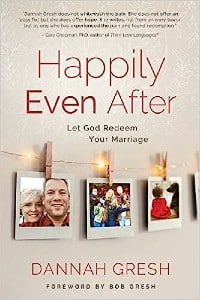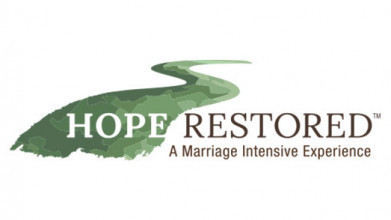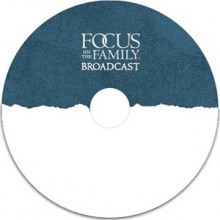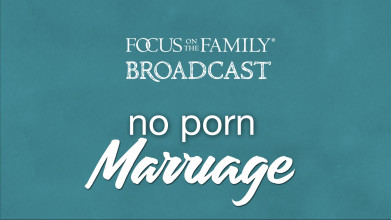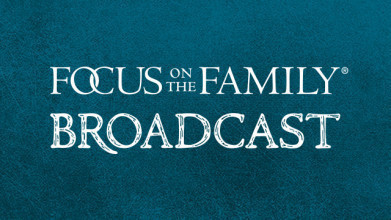Preview:
Dannah Gresh: And when we hit these bumps in the road, we tend to believe the lie, uh, I don’t need to tell anybody. Nobody needs to know about this. That’s Satan isolating you. Do not comply. You need to tell someone. James 5:16 says, “Confess your sins one to another, and then you will be healed.” Confession to Christ is the only thing that gives us forgiveness, right? That’s a supernatural thing that only Jesus can do. His blood on the cross erases the sin and gives us a clean slate. But there’s still healing to work out in our lives and in our relationships from the consequences of that sin. And that healing, according to the Book of James, happens in community.
End of Preview
John Fuller: Well, that’s Dannah Gresh, and she joins us today on Focus on the Family, along with her husband, Bob. Thank you for being along with us. Um, I’m John Fuller, and your host is Focus President and author Jim Daly.
Jim Daly: John, here’s a crazy thought. Uh, when we get married, we most likely bring baggage into the relationship.
John: Mm-hmm.
Jim: I think that’s the premise of c-, good counseling. And we have to continually work on this and become more like the Lord in which we profess faith toward.
John: Mm-hmm.
Jim: We’re gonna talk with a couple today, and it will be a very honest discussion. I think it’s gonna be extremely helpful to so many couples, and, uh, if you are not struggling with, uh, some of the issues we’re gonna describe today, there’s probably somebody in your orbit that is. So listen in, and let’s talk about how to make our marriages the healthiest they can be.
John: Yeah. And parents, be advised, we’ll cover some topics along the way here that, uh, you probably won’t want your younger children to be listening to. And Bob and Dannah Gresh, uh, as I said, are here. Um, Bob and Dannah co-founded the True Girl Ministry, and Dannah writes and speaks, and we’re gonna hear their story, which is captured in the book, Happily Even After: Let God Redeem Your Marriage. We’ve got copies of the book here at the ministry. Uh, our number’s 800, the letter A, and the word FAMILY, or stop by focusonthefamily.com/broadcast.
Jim: Bob and Dannah, welcome, uh, to Focus on the Family again. Great to have you.
Dannah: Thank you. What-
Bob Gresh: It’s great to be here.
Dannah: … an honor to be back.
Bob: Mm-hmm.
Jim: I mean, it’s not an easy subject, obviously, and people are gonna hear this. But, um, your marriage, uh, fell toward trouble, and, you know, you guys had to fight to keep it together, which I love. Thank you, first of all, for doing that. Um, let’s start with the moment everything came crashing down. What happened?
Dannah: Well, that was a hard day. I was sitting in our red leather chairs in our living room. I thought Bob was picking me up for a date to the county fair.
Bob: And, uh, I had a big confession to tell Dannah. I had to kinda plan it so it didn’t wreck her … I, I knew I was gonna hurt her heart, and, um, I confessed to her that the battle I was having with pornography and lust was, you know, escalating, and that I had … My only way back to God was gonna break her heart. And-
Jim: Why? Why, why did you say that?
Bob: Because of the sin that I brought to the marriage was gonna really hurt her.
Jim: Huh.
Bob: And I knew that it was gonna be like a hammer blow to her heart. And it was.
Jim: Of course.
Bob: And, uh, that began a noble fight for our marriage-
Jim: Yeah.
Bob: … that God has redeemed.
Jim: Now, uh, Dannah, um, we know the shoe can be on either foot today. This issue hits both sexes.
Dannah: Yeah.
Jim: Not equally, but men tend to, uh, you know, lean into these battles, sexual battles more than women. But more so, more women are having this struggle. But hearing Bob say that to you, it had to be crushing.
Dannah: It was crushing, but it made sense. I-
Jim: So some of the pieces came together.
Dannah: Pieces-
Jim: Wow. Okay.
Dannah: … of the puzzles started to fit together ’cause I had felt for about 18 months that I was crazy, really crazy.
Jim: Huh.
Dannah: I just felt something was off. Um, I was manifesting a lot of physical symptoms of, uh, trauma. Betrayal trauma.
Jim: Huh.
Dannah: I know what to call it now. I didn’t know what to call it then. And so, um, one of the things that was really troubling for me during this time is Bob wasn’t making eye contact with me in the same intimate way that he had been previously. Now, I know that in retrospect, but I didn’t really understand it in real time. And women tell me all the time, “Your story sounds just like mine.
Jim: Huh.
Dannah: “I was having headaches. I was sick all the time.” I, for me, I had chronic pain in my joints and my muscles, um, and I wasn’t well. I was going to doctors who were trying to figure out, did I have lupus or some other weird autoimmune disease?
Jim: Huh.
Dannah: And so I knew something was wrong with us, but it was easier for me to just say, “I think something’s wrong with my body.”
Jim: Yeah.
Dannah: That felt safer, less scary.
Jim: Now, let me, if I can, let me make sure there’s a little disclaimer in here. And you can knock this down, but I, I think sometimes when, especially … I know men ’cause I’m one.
Dannah: Yeah.
Jim: Um, I may not wanna make eye contact if I feel kinda belittled or I’m angry. I’ve, I’ve experienced that. So I, I’d be … I’m just warning people (laughs) that sometimes-
Dannah: Yeah. So-
Jim: … don’t take the symptoms, maybe, as far.
Dannah: Well-
Jim: But you’re saying a chronic-
Dannah: Chronically.
Jim: Yeah.
Dannah: Right. And you’re chronically, your husband’s not making eye contact, or chronically, he doesn’t feel emotionally present in the room. I’m talking about when it’s-
Jim: Yeah. A-
Dannah: … the quality of the relationship.
Jim: I just wanted to make sure-
Dannah: Yeah.
Jim: … ’cause some people will hear this-
Dannah: That’s good.
Jim: … and then all of a sudden, you know-
Dannah: Yeah.
Jim: … “Well, you’re not looking at me. You must be-
Dannah: Or-
Jim: “… doing something.”
Dannah: … conversely, if you’re having a lot of colds and headaches-
Jim: Yeah. Right.
Dannah: … that doesn’t necessarily mean-
Jim: Right. (laughs)
Dannah: … that this is what’s happening in your marriage.
Jim: Yeah. So just again, to help couples, because that’s what we want today, this isn’t just-
Dannah: Yeah.
Jim: … a talk about a really tough time. It’s to reach out to you who are watching and listening, to say, “If you’re struggling with this, this is what you need to do.” And we’ll get through that today and next time. But h-, how did you respond? Dannah says she … Okay. Pieces begin to fit together. And she could understand maybe even her, her health issues at that moment, maybe. Uh, Bob, what about you? I mean, here you lay this out there. Now, data shows like 68%-70% of men in the church-
Dannah: Mm-hmm.
Jim: … are struggling. I know people are going, “What?” That’s what the research shows.
Bob: Right. Right.
Jim: So I, I’m shocked at that number.
Dannah: Yeah.
Jim: But it is what it is. Um, you had the right motivation to say, “Okay. Dannah, here, here it is.” What did that feel like when it came out of your mouth?
Bob: Well, what it felt like was I had vomited all over her. Okay. And after I did that, I felt better. I felt so much relief.
Jim: Yeah.
Bob: And I, that’s horrible to say, but I felt so much relief that the word picture I used was I took the car. I ran over my wife. The air bags deployed, and the ambulance came and immediately took me to the emergency room ’cause I was the one with the problem. And there was my wife injured on the highway and doesn’t get a lot of help ’cause it’s the-
Jim: Right.
Bob: It’s the sinner that gets it. But I felt a tremendous amount of relief because I’d been holding this back. And that was … I was inside-out.
Jim: You then went into … I mean, I think pretty quickly, you went for therapy.
Bob: Right.
Jim: You went to talk to a counselor and to get into, uh, a program that would help specifically for this.
Bob: Right.
Jim: But something wasn’t working. What happened?
Bob: I went to a, a top kind of, uh, clinic that, uh, was more secular. And-
Dannah: Managed care clinic. And they told us they had a faith-based track.
Jim: Okay. (laughs)
Dannah: But we knew it was clinical care that we were getting, and we felt like that’s what we wanted.
John: Well, I’m sorry, but what does managed care mean?
Dannah: Managed healthcare, that, that means that it’s … There’s a process. They’re going to monitor you. They’re going to monitor all aspects of your mental wellness, your physical wellness, and then they’re gonna have treatment options for you available there. But it’s not, um, one-on-one therapy. It’s not you’re getting tons of great PhD care, one-on-one care.
Jim: Huh. So what did you do? I mean, you obviously … How many days or weeks into this did you go, “Okay, wait a minute”?
Bob: I was there about three weeks, and I was like, “This isn’t really working.” Of course, I was looked at as the total, like, you’re quitting the program, and, you know, you’re the whatever. But I w-, I then went to-
Dannah: Well, we should say that the Lord really revealed to us on the same day. We were half a continent apart from one another. And I was walking past those same red leather chairs, where he had confessed to me, and I had this … I don’t know if this has ever experienced. I just dropped to my knees and started praying. I don’t know that that’s ever happened to me another time in my life. I knew I needed to intercede for him. And as I was interceding, and keep in mind, I am all about this program that he’s at. I’m all about we’re gonna get the best help that there is. This is going to be fixed. There’s no way in my mind that he’s leaving that program ’cause he’s only halfway through. And what comes out of my mouth in prayer is, “Lord, please reveal to Bob that he needs to leave that program.” I actually went, “What did you just say?”
Jim: Mm-hmm.
Dannah: Like I was confused. But I, I prayed, and I interceded, and then I stopped, and I wrote down what time that happened because I thought-
Jim: Huh.
Dannah: … “I need to know what’s going on with Bob right as I’m praying.”
Bob: And that was about the exact time that I was talking about leaving the program and talking to the administrators there. And we believed it was important to have, not just to say, “Let’s pray it away.” But there is some psychology to it. There is some things you have to learn. And so I went to a two-week, um, kind of retreat where it was four hours a day of counseling and then four hours a day of, you know, kinda processing, and we believe in that, that approach.
Dannah: It’s a program that combined clinical care with biblical care.
Jim: Yeah. And I think that’s certainly what we support at Focus on the Family. There’s obvious, uh, necessity to have a foundation of faith in that-
Dannah: Mm-hmm.
Jim: … experience, and then to be with people clinically that know how to get a couple or an individual from A to Z. Right?
Dannah: Right.
Jim: That’s the goal. How do we identify my issues, and how do I get on a better track before the Lord-
Dannah: Mm-hmm.
Jim: … not just before the counselors? Right.
Bob: I should, should also say it was a, it was a source associated with Focus on the Family that got us there-
Jim: Oh, that’s good to hear.
Bob: … that gave us that.
Jim: The other referral.
Bob: Yes.
Jim: (laughs) Well, good.
Dannah: Yeah.
Bob: Yes.
Jim: You know, it, it, there’s always … You never know if it’s gonna work. We’re always hopeful. But it is good that we do a good vetting process on our referral network. It’s not 100%, but we think it’s pretty strong.
Dannah: Yeah, it is.
Jim: And that helps us.
John: Yeah. And we’re a phone call away. If you’re finding something that you’re up against, either as an individual or as a couple, as a family, you need help, and you don’t know who to talk to, give us a call. Our number is 800, the letter A, and the word FAMILY. 800-232-6459. Uh, we’ve got details about our counselors and how they can help at focusonthefamily.com/broadcast.
Jim: Uh, Dannah, right after Bob confessed to you, um, what was your … You know, you’re processing this, obviously. We talked about that immediate emotional impact.
Dannah: Mm-hmm.
Jim: What were next steps that you took? Did you call a friend? Did you try to figure out-
Dannah: I-
Jim: … what do I do?
Dannah: Yeah. I got up out of those red leather chairs, and I said, “I need to go for a walk.” (laughs) I was really … Um, even though pieces of the puzzle came together, I was shocked. And I didn’t cry. I wasn’t emotional. I walked out in the woods, and I thought, “Okay, Dannah. You know how this works. Tell someone.” I’ve been telling people for 20 years, “When there’s sexual sin, sexual pain in your life, in the life of someone you love, don’t let the enemy isolate you.” He walks about as a roaring lion, seeking who he may devour, and he does not go after the heard. He goes after the lone person. So I got on the phone with a friend and said, “I just have to repeat what my husband just said to me.” And her name was Donovan Lear, and she began to pray for me. And she prayed a bible verse that we know, like, since little children. She just said, “Lord, I pray that you would give Dannah direction. She doesn’t know what to do, but your word says it’s a lamp to her feet and a light to her path. So make her hungry for your word because it’s gonna show her where to plant her feet.” And, at that moment, I feel like I just activated, through the word and through prayer, and I came back, and I said, “Okay. We gotta find a place. We’ve got to do some research.” And we got online, and we said, “Where do we go from here?” And we became partners in solving and decision-making-
Jim: Wow.
Dannah: … pretty quickly.
Jim: Yeah. I mean, that’s phenomenal.
Dannah: Yeah.
Jim: Let me ask you, because I’m, I’m sure people are watching or listening that maybe they’ve gone through a similar experience, and they didn’t have that good friend to call and give them that wonderful wisdom in that moment.
Dannah: Mm-hmm.
Jim: And the enemy did separate them out and began to devour their heart, so to speak. And you get into a place of bitterness and vengefulness, and you come back from that little walk. You didn’t talk to the friend who … to give you good counsel, and you come back and say, “Okay. Let’s go at it.” And you’re the jerk, and-
Dannah: (laughs)
Jim: … you know, this is gonna work or whatever the solution might be in your fleshly-
Dannah: Yeah. Well-
Jim: … response.
Dannah: … I guess what you’re getting to is, uh, I feel like a little convicted ’cause we have-
Bob: Yeah, we’ve done a lot of that.
Dannah: We have moments like that, too. (laughs)
Jim: No, and I appreciate that-
Dannah: We, we’ve had those-
Jim: … realism.
Dannah: … moments, where-
Jim: Yeah.
Dannah: … we’ve been angry. That was a good moment for me.
Jim: You need that.
Dannah: Yeah.
Jim: That venting.
Dannah: But there were moments, um, you know, his brain wasn’t well because it was fried on pornography. My brain wasn’t well because it was operating out of this betrayal trauma that I was sensing and experiencing. So we had some unhealthy conflict in this, too.
Jim: Well, and, and I think it goes, then, to the shame discussion. And, you know, let’s come back to you, Bob. I mean, the shame of that, the confession of it, you’re the perpetrator. You’re the wrong person here.
Bob: Right. Right.
Jim: You’re the sinner.
Bob: Right.
Jim: All those things are true.
Bob: Yes.
Jim: Uh, but one thing’s still true. God still loves you.
Bob: Right. Right.
Jim: And people tend to forget that.
Dannah: Yeah.
Jim: A lot of spouses tend to forget that. You’re still loved by God.
Dannah: Mm-hmm.
Jim: And with the right contriteness, you’re forgiven by God-
Bob: Right.
Jim: … if you confess that. But how did that shame begin to play in your heart? Now somebody else knows. It’s not a secret sin anymore.
Bob: Right. And then a bunch of people knew-
Jim: Right.
Bob: … because of the position I was in, and, and, um, but they rallied around me. They, they accepted me. You know, um, I’m not in a perfect place. There is shame that comes back. I mean, there’s … These conversations are hard for me at times. There’s things that happen when we, we’re together. There’s triggers that trigger her back to memories-
Jim: Yeah.
Bob: … that I have to say, “Th-, those are consequences on me.” The weirdest one was that I came home one day, and just cleaned the house and did everything, thought, “She’s gonna love this.” And she walked in and, and responded in a very cold way. And I was like, “What’s happening?” And she said, “This is the kinda thing you did-
Jim: Oh. To-
Bob: “… after you acted out.”
Jim: … rid your guilt?
Bob: Yes.
Dannah: Yeah.
Jim: Oh.
Bob: And the, the trigger thing is a big deal because there are times when, you know, she wanted to know where I was at, or she wanted to … You know, if I was up late on the computer, she wanted to know. And there was a transformation in me, where I realized, “That’s not a lack of trust. That’s a consequence of what, what I’ve done, and I can make her feel safe by answering that in a loving way.”
Jim: Yeah.
Bob: And that was a transformation, a repentance in me, to not get aggravated by those questions.
Jim: Yeah. In your book, Happily Even After, y-, you describe, um, helpful shame and toxic shame.
Dannah: Yeah.
Jim: Describe the two.
Dannah: Well, I think, you know, the Bible says that Adam and Eve didn’t have shame before the Fall, right? So that’s an emotion that didn’t exist before sin. So it’s part of experiencing and processing sin. And I think that in the New Testament, there’s a few times where Paul speaks about shame as a tool to bring us back to God. And I think there is a usefulness. You know, if I do something that hurts my family, I should be ashamed of that action. But I shouldn’t be ashamed of me. Toxic shame is when I start to feel like I am what’s wrong with the world. And I saw Bob experience both of those things. Um, I saw him experience shame in a way that drew him back to me and to God. You heard in his confession. He was saying, “I don’t know how to get back to God without hurting your heart,” ’cause he knew that our intimacy had to be repaired as part of the process. But I also saw, when, when I dropped him off at the airport, we have a different experience because I dropped him off at the airport to go to this clinic, and it’s like he wouldn’t look at me, and when he came over to kiss me goodbye, it felt like such an obligation. And I just felt rejected, right? But I wasn’t being rejected. That was his shame showing up.
Jim: Yeah.
Dannah: And his experience was that I wouldn’t say goodbye to him, that I wouldn’t kiss him, and so we were-
Bob: Well, and here I was leaving.
Dannah: Yeah.
Bob: I was gonna be gone for weeks, and she was left-
Jim: Right. In the road, so to speak-
Bob: Yes.
Jim: … to your earlier analogy. You’re on-
Bob: Well, as a husband-
Jim: … your way in the ambulance.
Bob: … and a person who wants to protect their wife, it wasn’t a good moment for me.
Jim: Yeah. Well, those are just tough learnings that, you know, I’m sure-
Dannah: Yeah.
Jim: … if you can wind the clock back and you’re in that spot, you might do it differently. But that’s just part of the process of slogging through this, right?
Dannah: Mm-hmm. Well, and one of the reasons we’re telling our story, which, by the way, wasn’t on our bucket list. (laughs)
Jim: (laughs) No kidding.
Dannah: But one of the reasons we’re telling our story is because it’s not a remarkable story. It’s not an uncommon story. It’s a very common story. And the church isn’t still talking about it. And so we just feel like, “Could maybe some people learn to fight for each other instead of with each other by some of the lessons we’ve learned through the battle?”
Jim: Yeah. Dannah, that girlfriend’s phone call, I do wanna emphasize that because-
Dannah: Yeah.
Jim: … looking for help, I mean, that was a cry for help.
Dannah: Mm-hmm.
Jim: That was a call. “Help me. I don’t know what to do.”
Dannah: Yeah.
Jim: So you called somebody you trusted, who might be able to help. How important is close community in that moment? It sounds like it’s very important to you at that moment.
Dannah: Yeah. We both agree that you can’t do this alone. It really wasn’t until we welcomed community in that we started to have a shift in the battle. And when you really think about it, we don’t experience any of our faith in isolation. Somebody led you to Christ. Somebody discipled you as you understood how to walk out your faith and read your Bible and pray and practice spiritual disciplines. And when we hit these bumps in the road, we tend to believe the lie, uh, I don’t need to tell anybody. Nobody needs to know about this. That’s Satan isolating you. Do not comply. You need to tell someone. James 5:16 says, “Confess your sins one to another, and then you will be healed.” Confession to Christ is the only thing that gives us forgiveness, right? That’s a supernatural thing that only Jesus can do. His blood on the cross erases the sin and gives us a clean slate. But there’s still healing to work out-
Jim: Right.
Dannah: … in our lives and in our relationships from the consequences of that sin. And that healing, according to the Book of James, happens in community-
Jim: Yeah.
Dannah: … not in isolation.
Jim: Bob, did you call anybody?
Bob: I called several people. I mean, I called five or six people, probably, and I honestly think that, you know, Satan is counterfeit, and so he overplays his hand. And I believe that the results of when you wanna recover from pornography and lust and all the other escalations is that the only way to heal is through the work of the church and bringing people together.
Jim: Yeah.
Bob: It’s a bummer ’cause you like to confess to God and be done with it and some … to, you know, tell anybody. But that’s not the way it works.
Jim: That’s not the healthiest way-
Bob: No.
Jim: … obviously.
Dannah: And for Bob, it, you made a big change from meeting with men on a weekly basis, that really, we both felt a shift in the battle when you made that change.
Bob: Yeah. I called one guy that I really trusted and that was ahead of me on the path, and he said, “Okay. Call me every day.” And I was like, “Every day? Isn’t this like a once a week thing?” And he said, “No, every day.”
Jim: Right. I mean, that’s good accountability, really. Yeah, that’s good for men to be able to have that kind of friend-
Bob: And it’s easy to-
Jim: … that is a close friend.
Bob: … stay connected with-
Jim: Yeah.
Bob: … phones and things like that.
Dannah: Don’t you think it’s more consistent with what we read about in Acts 2 to do it that way?
Jim: (laughs) Absolutely.
Dannah: When we talk about, like, they met daily. They met daily. Maybe it was not just because they were empowered with the Holy Spirit, not just because they were on mission for Jesus. Maybe they also knew they needed each other.
Jim: Huh.
Dannah: And we’ve, we kinda have amnesia when it comes to that in the body of Christ.
Jim: Absolutely. And we’re down right at the end. Tomorrow let’s come back, talk about the way God provided that path that you alluded to earlier. Lit your path, right?
Dannah: Yeah.
Jim: Right out of scripture. And, uh, we’ll begin to, I think, give the way forward for healing, which will be really good. But Dannah, I’m thinking of the women right now who feels, maybe, that the pieces are still kinda disparate. They’re not-
Dannah: Yeah.
Jim: … coming together, but she’s got a hunch-
Dannah: Mm-hmm.
Jim: … that she’s worried about this. Maybe it’s even shown itself physically for her. Um, what do you say to her, given you were in that position and on that spot?
Dannah: Yeah.
Jim: What is some counsel you would give her?
Dannah: I think I would, first of all, talk with another godly woman. For me, I talked with a licensed Christian counselor that 18 months when I was waiting for Bob to really, um, share with me what was going on in his heart and life. I didn’t know that’s what I was waiting for. I just knew I needed help.
Jim: Yeah.
Dannah: So get the help you need. And then she had me pray. She said, “Dannah, we can’t lean on our own understanding because only the father knows what’s happening here. We have to trust in his way, so we are gonna pray. Lord, we don’t have understanding here. But you do. So we trust you. We trust you for every word Dannah’s gonna hear. We trust you for every step Bob is taking in his life. We trust you for what’s happening in Dannah’s mind and Dannah’s body. Will you bring understanding?” And I prayed that prayer for 18 months.
Jim: Let me also just ask, in that emotional response, how for you, the victim, how did you contain a unhealthy response? I know you said that you had them, and-
Dannah: You mean in the moment, in the disclosure?
Jim: But, but, well, in the disclosure, but also the days and weeks following that.
Dannah: Yeah.
Jim: It’s so easy to check out-
Dannah: Yeah.
Jim: … ’cause I think we have that kinda mentality as part of the culture, not part of scripture.
Dannah: Mm-hmm.
Jim: Let’s just check out. I’m done.
Dannah: Yeah.
Jim: Um, how to contain that appetite to just resolve it by walking out the door?
Dannah: Oh. Well, that’s resolved only through community around you and prayer ’cause there’s, it’s so much easier just to check out. And here’s the thing. If you have a pornography ho-, problem in your home, you have a loneliness problem in your home. The research bears this out, that loneliness is feeding the pornography problem in your husband’s heart. He is exceedingly lonely. And if all you do is pull away and yell and scream, even though I know you’re sinful, too, and there will be those moments, if you don’t lean in to love him in his brokenness, the way that Christ loves us in our brokenness, you really don’t have any hope-
Jim: Yeah.
Dannah: … of healing.
Jim: And there’s so many raw emotions in this. Uh, first of all, just thank you for this first day of talking about this very difficult subject. My goodness. Being willing to lay it out there, um, and to help others, which is-
Dannah: Yeah.
Jim: … your motivation, I so appreciate that. It takes great courage, so thank you. Thank you for being here. Let’s come back next time-
Dannah: You’re welcome. Thanks.
Jim: … and talk about the Lord’s journey forward. And if you’re in that spot or you think maybe you’re in that spot, uh, give us a call here at Focus. 45 years of experience. I think we’ve heard it all. And, uh, even if it’s a different story, it won’t surprise us. We know humanity. We know scripture. We know the way forward, actually. I think our counselors are that good.
John: Mm-hmm.
Jim: And that’s something we’re committed to. We’ll, uh, have a counselor call you back and spend some time with you on the phone, provide resources, maybe recommendations for treatment. We have a very successful program called Hope Restored. It’s a four-day intensive. That’s what most people do, and it has a 80% success rate. And a high volume of those, uh, marriages are dealing with infidelity and pornography. It’s just part of it. And, uh, they are very skilled at helping you as a couple get back on track with the Lord. And I’m proud of that program. So no matter where you’re at, get in touch with us. Let us help you. Don’t be isolated, like Dannah mentioned earlier, and let the enemy crush your soul. And, uh, obviously, getting a copy of their book, Happily Even After, uh, you can get that directly through Focus on the Family. Make a gift of any amount, and if you can do it monthly, that’s great. And I wanna say, if you can’t afford it, that’s great. We’ll get it out to you. If you need it, we’ll get it to you and trust other people will cover the cost of that.
John: Mm-hmm. Yeah. We have a great team of donors who, uh, regularly contribute to the ministry. It makes so much difference for us to be able to offer all these resources. Uh, contact us today if you need help, uh, in any way, shape, or form, as Jim has mentioned. Uh, our number is 800, the letter A, and the word FAMILY. We’ve got details about these resources online. Uh, also ways to donate either monthly or a one-time gift. Again, 800, the letter A, and the word FAMILY. Or stop by focusonthefamily.com/broadcast. On behalf of Jim Daly and the entire team here, thanks for joining us today for Focus on the Family. Uh, join us again tomorrow as we continue the conversation with Bob and Dannah Gresh and, once again, help you and your family thrive in Christ.












